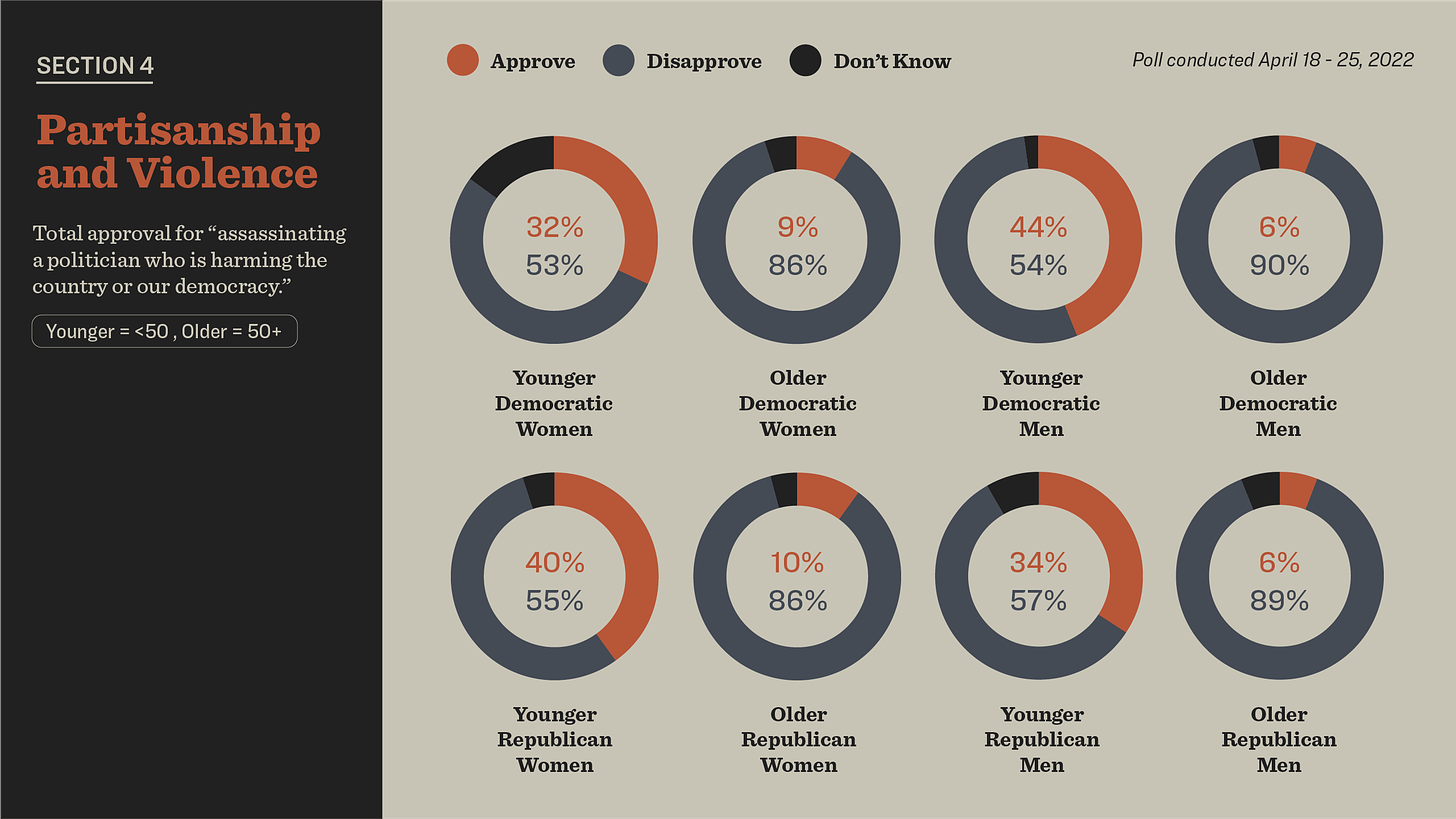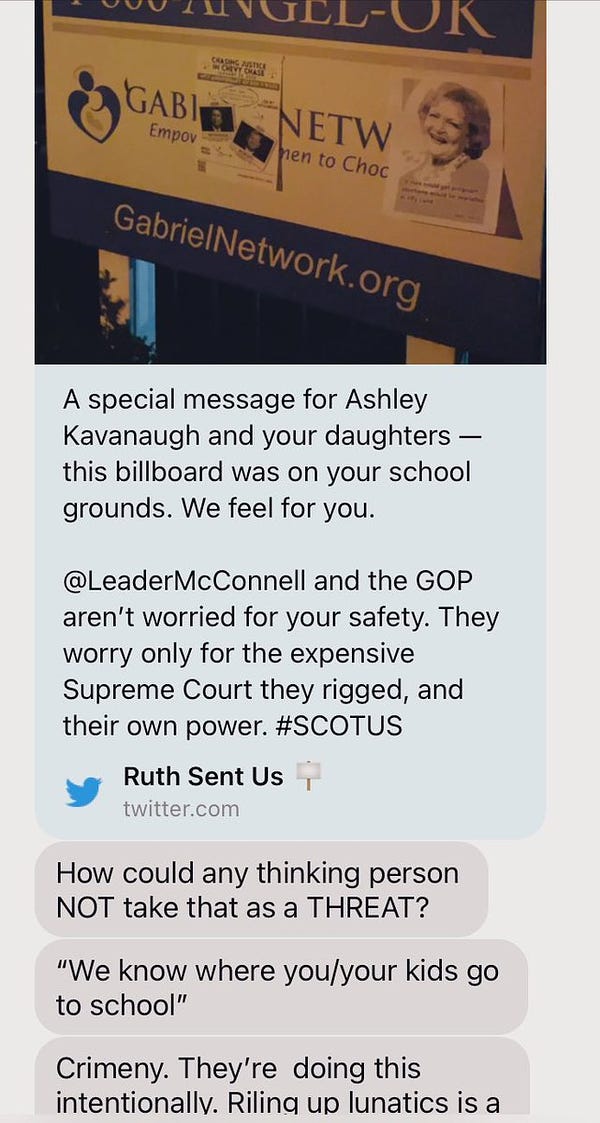Get Ready, Folks: Another Civil War Is Coming
In fact, you’ve already caught a glimpse of what it’s going to look like, you’ve probably just forgotten.
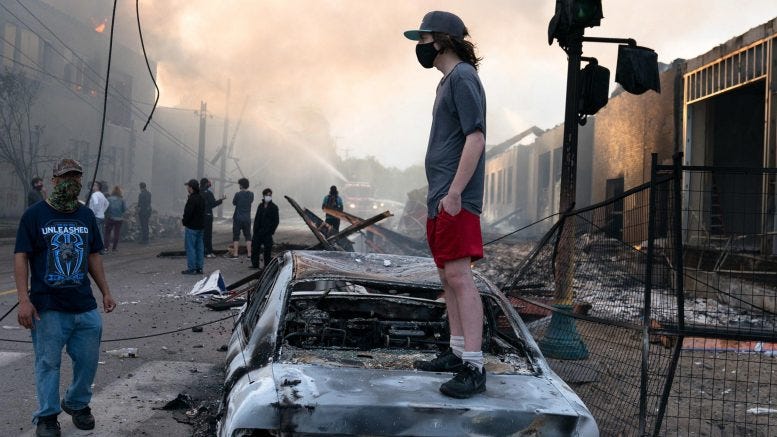
Ominous signs reported in a recent survey:
Our survey found that Republicans and Democrats are not only extremely distrustful of each other, but that majorities believe that people on the other side of the aisle are immoral and “want to harm people who disagree with them.” Sixty-three percent of Republicans say Democrats are a threat to the country, while 67% of Democrats believe the same about the opposing party. While each side views the other as similarly threatening, Republicans rank “extremists in the Democratic Party” as the most pressing threat facing the country, while Democrats believe the top three threats, in descending order, are Vladimir Putin, Donald Trump and extremists in the Republican Party.
Those on the right appear more likely to approve of political violence. When asked whether they believed that “some violence might be necessary to protect the country from radical extremists,” 41% of Republicans agreed, compared to 34% of Democrats and 29% of independents. Over half of Republicans say the country seems headed toward a civil war in the near future, compared to 39% of Democrats.
While most Americans reject antidemocratic actions and political violence, a substantial minority — and, sometimes, a majority — do not. Perhaps unsurprisingly given the Republican response to the 2020 election, 60% approve of “allowing citizens to monitor voters and polling places to prevent election fraud, even if it is considered voter intimidation.” Fewer than 4 in 10 Democrats agree.
It shouldn’t surprise anyone that both sides regard each other with fear and loathing, but one side - the Right - seems more convinced than the others that it’ll boil over into violence. Perhaps it’s because the Right feels most under siege due to the Left’s capture of all the country’s institutions, on top of a radical left-wing administration in the political driver’s seat, but it’s also true the Right has felt for years, maybe decades, that state and society are working against them. Actions and rhetoric by the Regime in recent times have, unfortunately, lent credence to suspicions on the Right.
But the most troubling finding from the study was the following (emphasis mine):
When we asked people if they would approve of specific violent action, approval declined but was still worryingly substantial. When we asked, for example, whether people approved of threatening a politician who is “harming the country or our democracy,” 24% approved. When we asked if people approved of assassinating a politician described in the same way, 1 in 5 approved. Levels of approval for both scenarios were slightly higher for Democrats than Republicans, driven largely by the approval of younger Democratic men. In perhaps a telling sign of the deep antagonism partisans feel for one another, more people approve of threatening or assassinating politicians they deem harmful than approve of destroying public or private property as a form of protest.
Not all of those who say they approve of violent actions are willing or able to commit them personally. The decision to carry out political violence depends on a multitude of factors, including opportunity, means and the broader political environment. But we do currently live in a moment when political leaders are leaning into violent rhetoric, meaning the social sanctions against violence could be eroding and, in the process, creating an atmosphere more conducive to acts of political violence.
Here’s a graphic displaying the responses to the question of assassinating politicians. There’s a slight partisan gap in the results, but age constitutes the greatest disparity:
The survey was conducted by the Southern Poverty Law Center (SPLC), which professes non-partisanship, but, in practice, is extremely ideological. The SPLC is aligned with the Left and makes their position very obvious throughout the report in the way they characterize and spin the sentiments behind the various responses. Historically, the organization has singled out the Right for extremism, while treating left-wing extremism as aberrational and an insignificant threat to the republic. However, the report still, I believe, captures the public mood in America well. I feel a similar poll conducted by an authentically non-partisan, unbiased entity would yield the same results, as the SPLC poll implicates both the Left and the Right. The findings are difficult to dispute when those most likely to support the SPLC and its efforts end up getting dragged in the process.
A recently as a few years ago, I might’ve found these findings disturbing, but not alarming. Today? Look at what happened early on the morning of Wednesday, June 8:

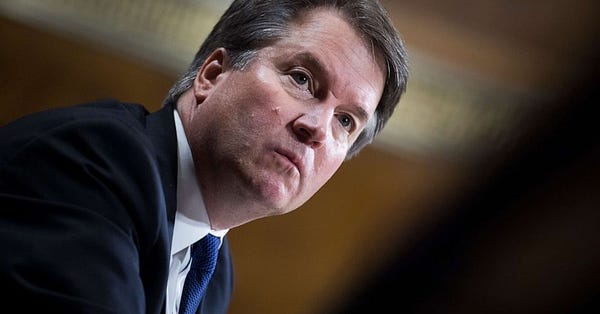
Shortly thereafter, a pro-abortion group known as “Ruth Sent Us” addressed the following to Justice Kavanaugh’s wife:
This incident was large dismissed by the media and many on the Left seem to have tacitly approved of it. This should serve as a blatant warning sign of how much danger this country is in. There have also been a number of attacks at pregnancy support centers in the wake of the Supreme Court leak concerning the fate of Roe v. Wade. The latest occurred in Buffalo, New York and was the work of a pro-abortion terrorist group known as Jane’s Revenge. If talk of assassination and political violence was once just the expression of sentiments buried within the deepest parts of our psyches, it sure seems like a bit more than deep, dark thoughts, now.
Thought I’ve discussed the topic at length in this blog, I’ve side-stepped the question of whether I think the United States is headed for another civil war. My views have evolved on the matter and I feel fairly confident at this point to render a verdict:
Yes. America is headed for another civil war.
Before you bristle and squirm in your seat, take it easy for a moment, because you don’t need start considering the prospect of life as a war refugee, nor do you have to worry about the country becoming like Iraq, Syria, or 1990s former Yugoslavia. This next American civil war will be rather short and it may even be forgotten in due time. It probably won’t even be recorded in history as a civil war, as it may not fit the academic definition of the term. But its consequences will be with us for years, maybe decades, to come and all around us will be telltale signs of the carnage that once engulfed our country. In fact, you’ve already caught a glimpse of what it’s going to look like, you’ve probably just forgotten.
Before the decade is out, we’ll probably see this civil war take place. It’ll be a far cry from the first, but the damage it’ll do will render any comparisons a meaningless debate. Think of 2021 South Africa as a perfect example of what’s over the hedge for the country. For over a week in July, the country was wracked by mass unrest, with rioters burning, damaging, and looting everything in sight:


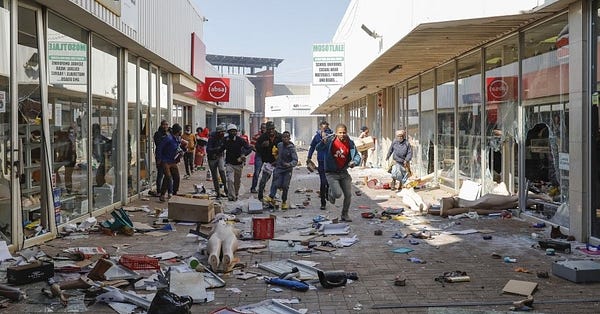
R20 billion equals approximately $1.2 billion. From our perspective as Americans, this may seem like a bearable loss, but given the disparity in currency value and the respective economies, this amounted to a devastating loss for South Africa.
It wasn’t until the third day of unrest that the president finally ordered the military to deploy and restore order. By then, the damage had been done. In the end, 354 had died, a few thousand arrested, along with the aforementioned monetary losses.
Unrest isn’t the same thing as war, but that’s exactly the point - if the civil wars of Africa and the Middle East seem beyond the pale here in the U.S., large-scale unrest most certainly isn’t. Long since memory-holed, the U.S. experienced nationwide rioting and looting in the wake of the death of George Floyd while in police custody:

I don’t know about you, but in summer 2020, it sure looked like our country was in a state of civil war:

The 2021 South African unrest erupted because a former president was arrested and charged with crimes. The 2020 U.S. unrest occurred because a Black man died while in police custody. Both instances occurred while the countries were embroiled in serious economic turmoil - South Africa has been in a near constant state of economic crisis since the end of Apartheid, while the U.S. was in the midst of a self-induced economic depression as an anti-COVID measure. These incidents don’t happen often, at least not in the U.S., but it also doesn’t take a lot to set them off.
The fact that assassination is something young Americans view as justifiable is enough evidence proving the threshold for political violence has narrowed dramatically in recent times. Today, the number of flashpoints are legion - abortion, crime, race, you name it. About the only thing holding the country together at this point is the economy and even that looks to be teetering on the edge. Look at the latest inflation numbers:

It’s also becoming virtual certainty the economy will enter a recession within the next year:
So, what happens when America experiences another serious economic crisis? If we’re not in one today, we’re certainly building towards one in the near future. It’s not hard to believe that chronic inflation and a deep recession could provide the spark necessary to push people over the edge. Currently, the masses are oriented towards tranquility - after all, despite the inflation, the economy continues to add jobs. There’s money to be made and good times to be had, it’s just all getting more expensive. People will tolerate discomfort as long as their standard of living remains largely intact.
It’s hard to say when the civil war will break out, but when it does, not only will the economy be in recession, gas will be at least $8 - 10 nationwide and the cost of food will be at least one-and-a-half times higher than it is today. Right now, the middle, working, and poor classes are bearing the brunt of inflation, but once the upper-middle-class and above, especially the politically vital professional-managerial class, start to feel a similar amount of pain, discontent will be widespread. An environment of severe polarization will breed hatred over differences on abortion, guns, and other political issues, leading people to start firmly picking sides and increasingly adopt radical views.
The civil war will likely last only a week or so, just like the 2021 South African unrest. As is their wont, the authorities will be slow to respond, unwilling to take heavy-handed measures against “peaceful protesters” or afraid to overreact. But in a few days, the situation will be out of control and there will likely be no choice but to deploy the military to restore order, something they declared, back in June 2020, they would never do.
Unfortunately, by then, the damage will have already been done. Americans will have come face-to-face with their deepest, darkest fears, plus the realization that the system that was supposed to protect them failed them yet again. It’ll only be thanks to armed citizens many communities will survive these dark days intact. Some parts of the country might be spared altogether, but for Americans living in the major metropolitan areas, they’ll have lived through a true “s**t-hits-the-fan” (SHTF) nightmare.
But, eventually, the rioting will burn itself out. There’s only so much you can destroy and loot, after all, and even those sympathetic to the rioting will eventually decide enough’s enough - everyone has to get back to making money and having good times again! Of course, we’d have to somehow get past the unbelievable carnage left behind - burnt out city blocks, destroyed business, millions of dollars of stolen goods, and thousands arrested, injured, and, unfortunately, some hundreds dead.
Somehow, America will manage to move on. People will rally together, often aided by do-gooders, to clean up the mess and go back to work, school, and trying to enjoy life. But much as they try to forget, the long emergency is just beginning. This civil war, despite its brevity, is just the thunderous opening to an internal conflict that’ll last up to a generation, if not more. Again, think not of war-torn Africa and the Middle East, but of Latin America and Northern Ireland. Most days, you might be able to go about your daily lives without any realization of the war at home. Other days, you won’t be able to escape the reality of it.
Like our country, this internal conflict will be diverse in character. Despite an overall low-intensity nature, the conflict will be more intense in some areas than others. For example, places like the Pacific Northwest, a hotbed of militia activity, will see clashes between such groups and federal authorities, matching or even exceeding the violence seen in the early-1990s, a modern-day high-water mark of sorts for militia activity in the U.S.
Meanwhile, cities and major metro areas will see rampant criminal activity, just as crime skyrocketed in the country beginning in 2020. A combination of the breakdown of order and authorities unable or unwilling to uphold the rule of law will legitimize criminality like never before and, as we’re seeing today, even previously tranquil locales will become more dangerous. In fact, crime will be the manner in which most Americans will be impacted by the internal low-intensity conflict. Crime is a national security issue because a country where the rule of law cannot be upheld is a failed state. I don’t believe the U.S. is going to become a failed state, but this is merely the consequence of a country that endures rampant criminality on a long enough timeline. Our individual likelihoods of becoming victimized by violence will increase over time and the number of places we can go with a reasonable expectation of safety will narrow, as well.
The arena of the internal conflict that will attract the most attention, however, is the political. Going back to the fact Americans are becoming increasingly in favor of assassinations and political violence, I fear we may see more of both in the coming years. The U.S. is no stranger to either and the Regime and some of our fellow Americans may go as far as to facilitate these acts, even while not being legally responsible for them. The Right may have its militias and paramilitaries, but the Left has a large number of militants as well in groups like Antifa and will increasingly have a larger number of individuals willing to join and participate in mayhem. In fact, most of these acts of violence will be committed by the Left, thanks not only to the institutional and political cover offered by the Regime, but due to the fact the Right’s extremists will likely self-segregate and retreat to areas outside of metropolitan America (like the rural Pacific Northwest).
Political violence will serve the purpose of terrifying the citizenry and intimidating the political opposition, in some cases escalating to the level of guerrilla warfare and insurgency. However, most violence will be entirely senseless, serving no purpose other than “owning” the other side with bloodshed instead of Internet memes and one-line zingers. Consisting of assaults, murders, rioting, or even bombings, the tit-for-tat nature of the violence will create a self-reinforcing cycle that’ll be very hard to break and authorities will have no real answers on how to resolve the American “Troubles.” Again, it must be underscored the Regime will play a major role in the facilitation of this conflict, with the media reporting on it only in the most general terms and, depending on party affiliation, politicians will try to ignore or underplay the events, while maximizing focus on the acts of the other side.
Finally, there will be a war down at the southern border as it becomes overwhelmed with illegal immigrants and drug cartel activity. It will contribute to the violence deeper within the U.S. and law enforcement and National Guardsmen down at the border will often find themselves fired on by cartels better-armed than they. If deploying active-duty troops to the border seems unfathomable now, some future president will discover there exists no other choice when confronted with the fact the protectors already down there are out-manned and outgunned. In today’s Europe and Asia-obsessed age, it seems unlikely Mexico will become the most important foreign policy challenge for the U.S., but in a generation, we’ll all know it without thinking too hard about it.
I realize this all amounts to a very dark vision of the future, of the rest of our lives, but I have never been one to shy away from what I feel to be the truth. Here’s the thing, though - most of us will survive. Or, at least, most of us will be fortunate enough to not become casualties in the next American civil war and the low-intensity conflict that follows. However, our lives will be nonetheless impacted and there won’t be any opting out. Just as the good people of places like Brazil, Colombia, Mexico, and South Africa learned to live with endless war and high violence within their borders, Americans, too, may need to learn to live with the world’s unpleasant realities.
It’s in this context a new order will emerge, it’s full character yet to be determined. However, it won’t look anything like what most Americans alive today grew up with and will be quite different from even what we have today. The end result of the next civil war and long war that follows is likely to be the end of the republic and the start of some other kind of regime. Our democracy, as least as we’ve known it, isn’t likely to survive the coming upheaval and it’ll likely be replaced by something we never thought could happen here: authoritarianism. Who exactly will be in charge of that authoritarianism is a question that will be unanswered until it happens.
I sincerely hope readers react to my prediction of our future not with despair, but with determination. Determination to survive the coming storm, determination to get right with God (if you’re a believer), determination to take better care of and love your family, and, most important, build resilient communities and networks with which to confront the unknown. Americans and people from all over the world, all throughout history, have faced such seemingly overwhelming challenges and lived to tell the tale. There’s no reason to think we can’t do the same.
It starts with recognizing the danger the country is in and caring enough to prepare. Apathy isn’t an option. Wake up, recognize the threat, and face it with courage, just as those who came before us did.
Max Remington writes about armed conflict and prepping. Follow him on Twitter at @AgentMax90.
If you liked this post from We're Not At the End, But You Can See It From Here, why not share? If you’re a first-time visitor, please consider subscribing!



